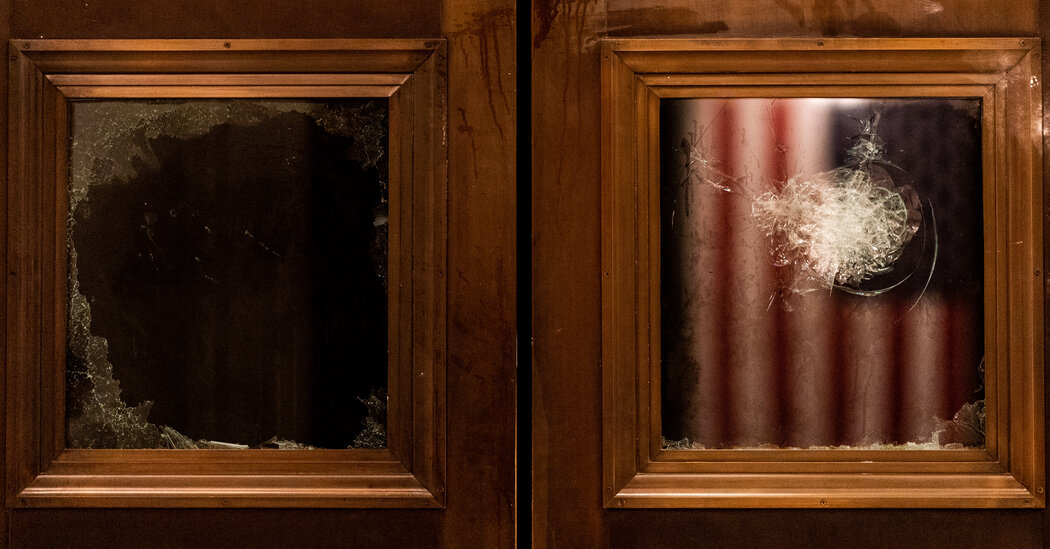The dueling pardons issued Monday by the outgoing and incoming presidents were the latest and perhaps clearest reminders of how Donald J. Trump’s efforts to rewrite the history of the Jan. 6, 2021, assault on the Capitol have gradually worn down the consensus that the riot marked one of American democracy’s darkest days.
There has never been any doubt about who was responsible for the violence: Mr. Trump’s supporters attacked the building, fought police and ransacked offices as they attempted to block the certification of Joseph R. Biden Jr.’s 2020 victory. Republicans and Democrats alike condemned the violence and Mr. Trump’s role in summoning an angry crowd to Washington.
But four years later, many Americans now view the events of Jan. 6 as a choose-your-own-reality narrative. Depending on one’s politics, heroes and villains have become interchangeable. Those who investigated the attack could be either truth-tellers or corrupt partisans. Those who attacked the Capitol and were jailed could be either criminals or “hostages.”
By pardoning the members of the House Jan. 6 Committee, which investigated the attack, and the injured officers who testified before the panel, Mr. Biden provided them protection against any politicized prosecution. But he also gave ammunition to those who believe the panel committed crimes. After all, why would they need pardons if they did nothing wrong?
“The two sets of pardons formalize the bifurcated, even schizoid, official memories of Jan. 6: with one large segment of the country seeing the Jan. 6 people as criminals trying to undo a democratic process and another segment regarding them as heroes who were unfairly persecuted,” said Alexander Keyssar, the Matthew W. Stirling Jr. professor of history and social policy at Harvard Kennedy School, who has taught a course about Jan. 6.
Mr. Keyssar said it is “remarkable” that “the contrast in memories has widened since the event itself. Or, to be more precise, that the number, or proportion, of people who accept the Trumpian version of the history, or at least tolerate it, has grown.”
There are often fights to control the narrative about major incidents in U.S. history, and they can rage for decades and bury some shameful events for generations.
Jan. 6 is not the first event to have been consumed by an effort to minimize it or shift the blame to others.
“The same thing happened during the Civil War,” said Jim Downs, history professor at Gettysburg College and editor of the book “Jan. 6 and the Politics of History.”
“The Civil War ended,” he said. “The issue of slavery then became buried by the South. People then built monuments and said that they were attacked by Northern aggression. The point is, who gets the power to tell the story? They can marshal whatever evidence they want in order to propagate a particular narrative.”
At first, supporters of Mr. Trump tried to blame the Jan. 6 attack on antifa or undercover F.B.I. agents. They alternately tried to recast the riot as a “day of love” in which protesters hugged the police — despite the 150 officers injured in the violence. They have suggested the prosecutors and members of Congress who investigated the attack are the true criminals, and demanded they be investigated.
On Monday, Mr. Trump, fewer than eight hours after being sworn in to his second term, took his final step in what has now been a four-year campaign to rewrite the history of the attack. He issued pardons to about 1,500 people accused of crimes in connection with Jan. 6.
At the same time, Mr. Trump condemned Mr. Biden’s pardons of the lawmakers, saying, without evidence, they were “very, very guilty of very bad crimes” and referring to the panel as the “Unselect Committee of Political Thugs.”
Representative Bennie Thompson, Democrat of Mississippi and former chairman of the panel, had been in conversations with Biden White House staff about the pardons and had asked for one, saying he feared becoming the victim of a politically motivated prosecution.
But others connected with the committee were surprised. Some staff members expressed shock at the move, but also relief that they could no longer be targeted by a prosecutor.
Mr. Thompson and former Representative Liz Cheney, Republican of Wyoming, the panel’s vice chair, thanked Mr. Biden in a statement.
“We express our gratitude to President Biden for recognizing that we and our families have been continuously targeted not only with harassment, lies and threats of criminal violence, but also with specific threats of criminal prosecution and imprisonment by members of the incoming administration, simply for doing our jobs and upholding our oaths of office,” the said. “We have been pardoned today not for breaking the law but for upholding it.”
There were others who watched the dueling pardons with a sense of distress.
Craig Sicknick is the older brother of Capitol Police Officer Brian D. Sicknick, who died shortly after the attack on the Capitol. His brother suffered multiple strokes hours after sparring with a pro-Trump mob during the Jan. 6 riot and died of natural causes.
He became politically outspoken after his brother’s death, and condemned Mr. Trump’s pardons of those who had participated in the Capitol riot.
“The message to me is that the United States is no longer a nation under the rule of law and anything goes,” he said. “If you tell a lie big enough and often enough, it becomes the truth, and that’s exactly what Trump is doing.”
Checkout latest world news below links :
World News || Latest News || U.S. News
The post In Dueling Pardons, an Intensified Fight Over the Meaning of Jan. 6 appeared first on WorldNewsEra.

